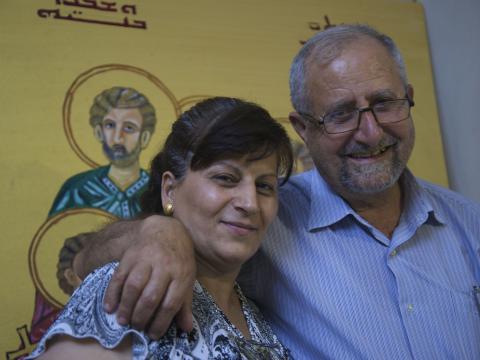"As Christians, we smile."

My mother is wonderful—smart, beautiful, and interesting—but she has a problem.
She cannot resist chocolate.
In high school, I brought home Mozart chocolates from Austria as a souvenir, a beautiful round candy, wrapped in gold foil with a picture of the young composer.
I didn’t plan to eat it. I just wanted to keep it as a reminder of a spectacular trip.
One afternoon my brother David came to me, clearly agitated. David is a good soul.
“You have to unwrap the Mozart chocolate,” he said.
“Why?” I asked.
“You just have to do it,” said David.
I did, expecting to find a round ball of creamy marzipan and nougat with a dark chocolate coating.
But no. Inside that golden wrapper was a blue plastic ball.
I was confused.
“Mom did it,” he said. “She asked me for a ball the same size to replace the chocolate so she could eat it.”
I walked to the kitchen with the plastic ball in my outstretched hand.
Mom blushed.
“It was delicious,” she said.
I bought more Mozart chocolates in Vienna on my way to Iraq.
It was fortunate. On my first day visiting World Vision’s projects, I was invited to dinner with a family displaced by the conflict.
I accepted with joy.
The family’s father, Ibrahim, works at a camp for internally displaced people. He wanted me to meet his wife, his two sons and daughter-in-law.
As we sat around the table, drinking thick cardamom-spiced Iraqi coffee from delicate china cups, I gave them the Mozart chocolates and told them the story of my mother, the chocolates, and the blue plastic ball.
They were delighted. But they had a better story.
They told how their mother, Rajaa, did something that still has them chuckling—and a little bewildered.
In August 2014, the family learned that they would have to flee their village near Mosul.
Armed groups were coming through the villages, driving tens of thousands of people, including 100,000 Christians, from their homes.
Ibrahim, told the family they must go.
But Rajaa wouldn’t leave.
Not until she had cleaned the house.
As they told the story, the family began to laugh. Rajaa laughed too.
“I always leave a clean house,” she said.
Youngest son Emir, 25, laughed the loudest.
Emir’s English is perfect. He had been pursuing a degree in English at a nearby University when the war disrupted his plans.
Emir said he’d told his mother that leaving a clean house was ridiculous, but then he smiled softly.
“I knew we weren’t coming back,” said Emir, ”but I fed the fish anyway. I even gave them a little extra food.”
The house cleaned, the fish fed, the family got into the car and fled to the Kurdish Region of Iraq where they now live as internally displaced people.
Starting over has been difficult.
Fluent in French, Arabic, and Aramaic, the language of Jesus, Ibrahim found a job working with other internally displaced people. Emir found work with a non-governmental organization.
Their possessions are few—some secondhand furniture, a few family pictures, and the keys to a house they’ll probably never live in again.
All they really have is each other.
They stay close, worshiping, eating meals together, laughing.
They miss home.
“After leaving, we dreamed we would go back,” says Ibrahim. “Now the dream is like a nightmare. It’s like we are in a sea with no end.”
Tears come to his eyes but just for a moment.
“What can we do?” says Ibrahim. “We smile. As Christians, we smile. We know that we will face a lot of things in our life. We have to be brave. We will be afraid. We could be killed. But we have hope.”
With that, the laughter returns as Emir plops another shish kebab on my plate.
I know that this is one of my most special evenings on earth, having dinner with this brave, funny family.
It makes me miss my own family whom I’ll see again when I return home on Mother’s Day.
I’ll be jet-lagged but with an incredible story to tell and a gift of Mozart chocolates for my mother, to thank her for being mine.